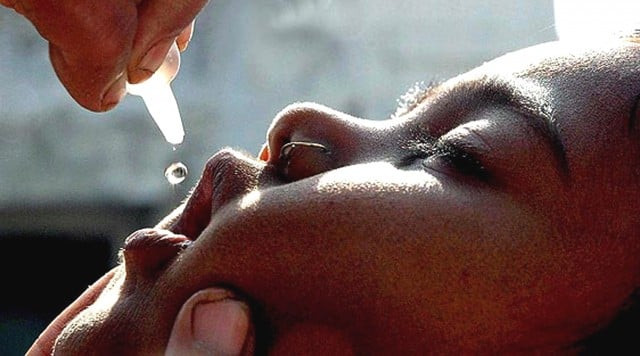Polio eradication: Time to pull up their socks
Polio cases rise from 86 in 2009 to 140 in 2010, Ministry of Health drafts emergency plan.

The need arose due to stark figures that showed that despite a much-publicised polio campaign, Pakistan had the worst indicators of children affected from the disease in 2010 in comparison to other countries, according to the Ministry of Health.
In India, about 685 polio cases were reported in 2009 which dropped to 41 in 2010, in Afghanistan, 31 cases in 2009 dropped to 24 in 2010, while in Nigeria there were 388 cases in 2009 which decreased to 15 in 2010. Pakistan remained the only country where polio cases increased from 86 in 2009 to 140 in 2010.
Sharing details, an official requesting anonymity said under the new action plan, a strategy is being planned to reach out to those in the Federally Administrated Tribal Areas (Fata). The region remained inaccessible by polio teams due to security and other issues and had 71 polio cases reported in 2010.
“There are about 300,000 children in Fata who are inaccessible,” the official said and added that their migration is also causing polio to spread in the country. Under the new action plan, polio teams will be working with army officials in these areas.
Moreover, the ministry has tried to involve influential people of these areas to make polio vaccination possible. Earlier, some religious clerics had expressed their reservations against the immunisation drive.
Talking to The Express Tribune, MNA Kamran Khan belonging to Waziristan said, “The government did not take us into confidence about the polio campaign.”
Munir Orakzai, an MNA from Fata, said, “The reason behind the increase in polio cases in the region is because of the migration of families from Afghanistan to this region on a daily basis.”
Sindh remained the second province with increase in number of cases, with 26 in 2010 from 11 in 2009. The rise was attributed to administrative problems and the recent floods.
The new action plan formulated by the Ministry of Health will be presented to the prime minister in the mid of January and later at the end of the month to the president for final approval.
Gates Foundation, World Health Organization, United Nations Children’s Fund and the Government of Japan will support the ministry in the formation and execution of the project.
The ministry will have DCOs, governors and chief ministers supervising and monitoring the campaigns and will be held accountable for the result. Participation of parliamentarians will also be ensured.National Manager of the Expanded Program on Immunization Dr Altaf Bosan said the action plan was still in its initial stages.
“A strategy will be chalked out to eradicate the disease completely from the county by the end of 2011,” he said.
Meanwhile, Dr Athar Rana, head of Immunisation Department Shifa International Hospital, said polio is a preventable disease but lack of awareness and irresponsible attitude of officials towards storing the vaccine in low temperatures were the main reasons behind rise in its cases in Pakistan.
Published in The Express Tribune, January 7th, 2011.



















COMMENTS
Comments are moderated and generally will be posted if they are on-topic and not abusive.
For more information, please see our Comments FAQ